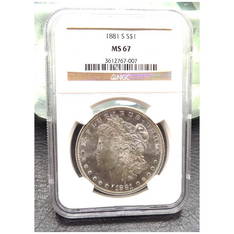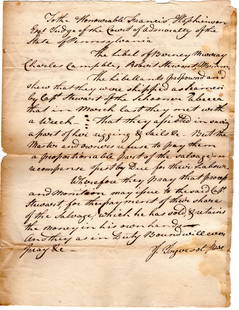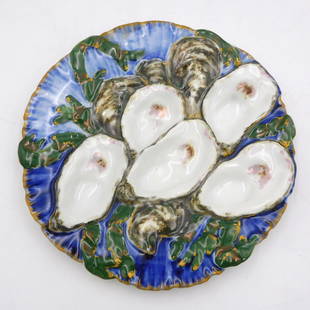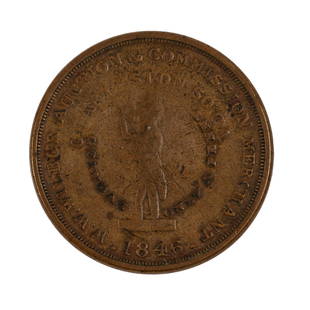
Phil. Merchant Writes to James McHenry, Constitution Signer and Future Secretary of War 1786-1802 14
Similar Sale History
View More Items in Historical Memorabilia
![James McHenry Writes Benjamin Tallmadge about Origin and Conduct of War of 1812: James McHenry Writes Benjamin Tallmadge about Origin and Conduct of War of 1812 JAMES McHENRY, Autograph Letter Draft, to Benjamin Tallmadge, January 23, 1813, Cherry Tree Meadows, [Maryland]. 2 pp.,](https://p1.liveauctioneers.com/6306/260874/135867891_1_x.jpg?height=310&quality=70&version=1662577413)
Related Historical Memorabilia
More Items in Historical Memorabilia
View MoreRecommended Collectibles
View More






Item Details
Description
Phil. Merchant Writes to James McHenry, Constitution Signer and Future Secretary of War 1786-1802 14 pp.
WILLIAM ALLISON, Archive of four Autograph Letters Signed to James McHenry, 1786-1787, and eight documents related to McHenry’s investment in a bridge company, 1800-1802. 14 pp. Expected folds; some edge and fold tears; some tears from opening seals; very legible; very good.
This small archive includes four letters written by Philadelphia merchant William Allison to James McHenry, who had married his stepdaughter Peggy two years earlier. McHenry would go on to serve as a Maryland delegate to the Constitutional Convention, where he would sign the proposed U.S. Constitution, and serve as Secretary of War under Presidents George Washington and John Adams. The letters concern business matters, horse breeding, family matters, and the upcoming Constitutional Convention. Eight additional documents from 1801-1802 relate to McHenry’s investment in the Schuylkill Permanent Bridge Company.
“You’ll see by the News Papers that our Assembly have appointed Seven Members to meet the Grand Committee in this City in May next. When your Assembly appoints, it would be pleasing to us to see your name among their Delegates....”
Contents and Excerpts
- William Allison, Autograph Letter Signed, to James McHenry, April 15, 1786, Philadelphia, Pennsylvania. 2 pp., 8.5ʺ x 13.5ʺ.
“The only advantageous business here for some time past, has been the Speculation of Paper, funded on this State, they are yet to be bought for about one third their Value, they have hithertoo been paid for in hard money, but I now think the other will do. I intend to Invest Bleakleys Interest in them if I can get it done. Times here in every business is bad beyond conception, no collecting old debts, nor raising Money out of real or Personal Property, houses, & Plantations, at sale very frequently by the Sheriff, & adjorned from time to time for want of bidders.”
“We are tired out with party rage & Poloticks, for all which shall refer to the Herrald. I attended the house three days on the debate of the Bank, and heard all the Orators on both sides.”
- William Allison, Autograph Letter Signed, to James McHenry, April 19, 1786, [Philadelphia, Pennsylvania]. 1 p., 8.5ʺ x 13.5ʺ.
“As I have given you a history of the Mares, I will only say, that the sick one recovers amazeingly. Nedd rides her a little twice a day. She looked well & trotted boldly this morning. I shall give her a few weeks Grass after which she with Jacks horse will answer every purpos we want in the horse way.”
- William Allison, Autograph Letter Signed, to James McHenry, October 18, 1786, Philadelphia, Pennsylvania. 1 p., 7.75ʺ x 9.5ʺ.
“Last Sunday morning I recd two long letters from Mr Samul Purviance.... The other, in part, was about a payment he says that was made by the late Wm West in Febry 1773 of £62..10..1½ for Interest on his bond to the Estate of David Caldwell., which bond is now in the hands of Mr McEldery, which he was about settling, and found no credit endorsed thereon but £180 paid by his brother John in July 1782. Requesting that I would put this matter to rights, as he had no receipt, nor other proof of payment thereof, but a letter from Mr West, and that not of his paying it to me, but to the Execur of D.C. I have wrote him pretty fully, by the return of his Son, and assured him the payment he mentioned was quite new to me, and to S. Caldwell, to whome I had shewed his letter, as neither of us had ever heard a breath of it before, and as Capt Mease was dead some years before the time he alludes to, its probable it would have been paid to me, as I did the business after his death.”
- William Allison, Autograph Letter Signed, to James McHenry, January 1, 1787, Philadelphia, Pennsylvania. 2 pp., 7.75ʺ x 9.5ʺ.
“The week after our arrival I set out on horse back for Eastown, sixty miles, had bad travelling from the depth of the Snow, as the roads were scarcely broke that way. I had the Premises that were Mortaged to us sold, by which we sink about ⅓ of the Debt, yet I think on the whole it was the best could be done.”
“You’ll see by the News Papers that our Assembly have appointed Seven Members to meet the Grand Committee in this City in May next. When your Assembly appoints, it would be pleasing to us to see your name among their Delegates, as it would give us a prospect of seeing Peggy & the Children here.”
McHenry was one of Maryland’s delegates to the Constitutional Convention and signed the U.S. Constitution.
- John Dorsey, Partially Printed Documents Signed, 6 Receipts, to James McHenry, for payments of 2nd through 8th requisitions by the Schuylkill Permanent Bridge Company, June 16, 1800-September 28, 1801. 6 pp., 7.5ʺ x 3.25ʺ.
John Dorsey (1759-1821) was the treasurer of the Schuylkill Permanent Bridge Company.
- John Dorsey, Partially Printed Document, Circular Letter, to James McHenry, May 10, 1802. 1 p., 4.875ʺ x 7.5ʺ.
“You are hereby respectfully notified, that the Board of Directors of the Company for erecting a permanent Bridge over the River Schuylkill, at or near the City of Philadelphia, have issued their requisition according to law, for a 9th & 10th payment of 2 dollar on each share of stock in the said company on or before the first day of April last, to be made to the Treasurer, No. 13, Church-alley.”
- [John Dorsey?], Manuscript Document, Receipt to James McHenry, June 15, 1802. 1 p., 4.25ʺ x 7.75ʺ. Payment of $36.33 for 9th & 10th Requisition on 20 shares of Schuylkill Permanent Bridge Company.
Although American General Israel Putnam had a pontoon bridge built across the Schuylkill River at Philadelphia early in the Revolutionary War, his troops destroyed it so it could not be used by the British, who built their own pontoon bridge in 1777-1778. It washed away in 1780, as did its successor in 1784. Bridge builder Timothy Palmer (1751-1821) designed the first permanent bridge over the river. With an overall length of 495 feet, it opened to traffic on January 1, 1805, making it the first bridge over a major American river. To protect it from the wind, rain, and snow, the bridge was soon covered with a roof and sidewalls, making it the first covered bridge in America. A fire destroyed most of it in 1850, but it was rebuilt and widened to accommodate railroad traffic. The rebuilt bridge lasted until 1875, when a fire completely destroyed it.
William Allison (ca. 1740-1787) was born in Ireland and migrated by 1756 to Philadelphia, where he became a merchant. He became good friends with fellow merchant David Caldwell, who had married Allison’s cousin Grace Allison (1737-1791) in Ireland before they emigrated to the colonies. When David Caldwell died in October 1762, his wife was pregnant with their third child Margaret (“Peggy”) Caldwell. In December 1763, William Allison married his cousin and David Caldwell’s widow and became a stepfather to Peggy. He and Grace Allison Caldwell Allison had three more children. He died in Philadelphia in June 1787.
James McHenry (1753-1816) was born in Ireland and sent by his family to North America in 1771 to regain his health. He settled in Philadelphia, where he completed an apprenticeship under Benjamin Rush and became a physician. During the Revolutionary War, he served as a surgeon. He became a secretary to General George Washington from May 1779 and to the Marquis de Lafayette from August 1780. He retired from the army in the autumn of 1781. He was immediately elected to the Maryland Senate in 1781 and as a delegate to Congress in December 1784. In January 1784, he married Margaret (“Peggy”) Allison Caldwell (1762-1833), the daughter of merchant David Caldwell (d. 1762) and stepdaughter of William Allison of Philadelphia, with whom McHenry first resided when he arrived in America. In 1787, he was a delegate from Maryland to the Constitutional Convention, and he signed the U.S. Constitution. He served in the Maryland House of Delegates from 1788 to 1790 and in the Maryland Senate from 1791 to 1796. In the latter year, President George Washington appointed him as Secretary of War, a position he held through most of the administration of John Adams. Opposed to many of Adams’s policies, McHenry resigned in May 1800 at the president’s request. He spent the remainder of his life at his estate “Fayetteville” near Baltimore, Maryland, that he had purchased in 1792. He maintained extensive correspondence with fellow Federalists Timothy Pickering and Benjamin Tallmadge. The famed fort in Baltimore harbor that played a central role in the War of 1812 is named for McHenry.
Provenance: Parke-Bernet Galleries, New York, ca. 1930s.
This item comes with a Certificate from John Reznikoff, a premier authenticator for both major 3rd party authentication services, PSA and JSA (James Spence Authentications), as well as numerous auction houses.
WE PROVIDE IN-HOUSE SHIPPING WORLDWIDE.
Buyer's Premium
- 25%
Phil. Merchant Writes to James McHenry, Constitution Signer and Future Secretary of War 1786-1802 14
Shipping & Pickup Options
Item located in Wilton, CT, usPayment

Auction Curated By




















![James McHenry Autograph Letter Fatherly Advice on College, Including Expense of Princeton!: Secretary of War and Signer of the Constitution James McHenry Writes to Son about Health and College JAMES McHENRY, Autograph Letter, Draft, to son [Daniel William McHenry], ca. June 1804, [Maryland].](https://p1.liveauctioneers.com/6306/260874/135867893_1_x.jpg?height=310&quality=70&version=1662577413)





















































![George Washington Signed Discharge: Partly printed discharge document signed by George Washington, as Commander in Chief of the Armies of the United States. Newburgh, [New York], 4 January 1783. 1 page, ## x ## in. Undersigned by Washin](https://p1.liveauctioneers.com/7226/322253/173251475_1_x.jpg?height=310&quality=70&version=1710004847)
![[Ambrotype] Texas Confederate Soldier: Sixth plate ambrotype. Full leatherette case. Portrait of a possible Texas Confederate soldier. A silver star device was used to pin up the brim of his light-toned headgear, a look often seen in image](https://p1.liveauctioneers.com/7226/322253/173251509_1_x.jpg?height=310&quality=70&version=1710004847)





